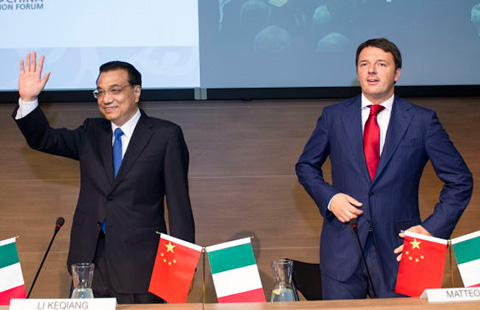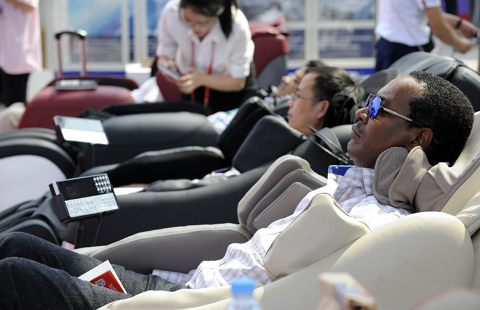More measures expected in China's healthcare reform
Updated: 2014-10-17 13:10
By Jack Freifelder in New York and Li Jing in Beijing(China Daily USA)
|
||||||||
Reforms in the Chinese healthcare industry over the last five years have seen improved services but yet to deliver "significant changes" that address the key issues of access and affordability, according to a healthcare expert.
"The objective of [the reforms launched in 2009] was to build a basic healthcare system that provided a safe, convenient and affordable healthcare service for everyone," Yanzhong Huang, a senior fellow for global health at the Council on Foreign Relations said Wednesday in a speech on the Chinese healthcare industry in New York.
Huang made his comments Wednesday during a lecture titled, The Trillion Dollar Question: How Successful is China's Healthcare Reform? He was joined by nearly 50 guests for a chat on the current state of affairs affecting developments in the healthcare industry in the world's second-largest economy.
New York University's Global Institute of Public Health hosted the event as part of its 2014 GIPH Speaker Series.
Huang said the reforms have led to improved public health services, like free immunizations and some [no-cost] medical checkup programs, but the reforms have failed to solve the problems of access and affordability.
According to the government data, the average inpatient and outpatient service costs, continue to increase at an annual rate of 10 percent, much higher than GDP growth. "Now the reform is at a critical juncture, further measures should be undertaken," Huang said.
Chen Qiulin, a researcher at the Chinese Academy of social sciences, said the key to China's healthcare reform is "to change the patient classification system and guild the orderly flow of patients".
He said that the reform will be successful only when people do not only rush to big hospitals.Chen said the fact that people intended to go to big hospitals and clinics, and small hospitals find it hard to find patients has not changed, compared with five years ago when China first initiated the national-level healthcare reform.
The healthcare system's issues lie not only in the number of hospitals but also the structure of hospitals, Chen added.
On Oct 9, the National Health and Family Planning Commission announced that China is planning to pilot a patient classification system in order to ensure the orderly flow of patients.
Song Shuli, spokeswoman for the commission, said it will use economic leverage to guide patients on matters such as medical care prices and health care insurance.
Recently, Beijing officially issued several opinions on healthcare reform to step up the building of the new "gatekeeper" system. In hope of establishing a pyramid-structure classification system, Beijing will compress large-hospital outpatient services to guide patients first diagnosed in the community and at the same time will strengthen and raise the medical capability of small hospitals and clinics.
Following the new opinion, Beijing will allow doctors in large public hospitals to operate private medical service part time.
In 2009, China unveiled large-scale plans to invest $124 billion to revamp its healthcare reform initiatives, according to a March 4 blog post by Huang on the CFR's Asia Unbound blog.
"The immediate result of this increased government spending has been expanded health insurance coverage," Huang wrote. "The percentage of people covered by health insurance surged from 30 percent in 2003 to 95 percent in 2011."
Huang said: "In fact, between 2009 and 2013, the government invested a total of $371 billion on Chinese healthcare incentives. These measures are important and necessary, but they're not sufficient."
China's healthcare spending is set to hit $1 trillion by 2020, based on research from McKinsey & Co, a global management consulting firm.
According to an October 2013 survey released by the Horizon Research Consultancy Group, an independent Chinese research firm, more than 80 percent of survey takers said they felt it was "difficult" to see a doctor. And more than 57 percent said it was "more difficult" than four years earlier (20 percent said it was easier).
On the issue of affordable healthcare, 95 percent of respondents categorized medical care as "expensive".
"Successful healthcare reform in China requires politicians to carry out some in-depth, fundamental reforms," Huang said. "Policymakers should have a clear understanding of the long-term context, and in order to succeed, sustained commitment to healthcare reform should be combined with broader governance reform initiatives."
Contact the writers at jackfreifelder@chinadailyusa.com and lijing2009@chinadaily.com.cn
(China Daily USA 10/17/2014 page2)

 Riding the Olympic Rickshaw in Vancouver
Riding the Olympic Rickshaw in Vancouver
 Film festival connects Chinese, American filmmakers
Film festival connects Chinese, American filmmakers
 Across Canada Oct 17
Across Canada Oct 17
 Premier Li attends the Fifth Italy-China Innovation Forum
Premier Li attends the Fifth Italy-China Innovation Forum
 WWII photos evoke lasting bond
WWII photos evoke lasting bond
 116th China Import and Export Fair kicks off in Guangzhou
116th China Import and Export Fair kicks off in Guangzhou
 Movie 'Hollywood Adventure' begins filming in US
Movie 'Hollywood Adventure' begins filming in US
 Mindboggling ways to bring the bride home
Mindboggling ways to bring the bride home
Most Viewed
Editor's Picks

|

|

|

|

|

|
Today's Top News
China-US summit will echo Sunnylands meeting
Analysts still bullish on Alibaba one month after IPO
Ambassador optimistic on China-Canada relations
The tenth Asia-Europe meeting opens in Milan
Patient with 'Ebola-like symptoms' admitted to Conn. hospital
Premier Li sows the seeds for farming
Short-film festival connects Chinese, North American filmmakers
US Ebola patient allowed aboard flight
US Weekly

|

|







